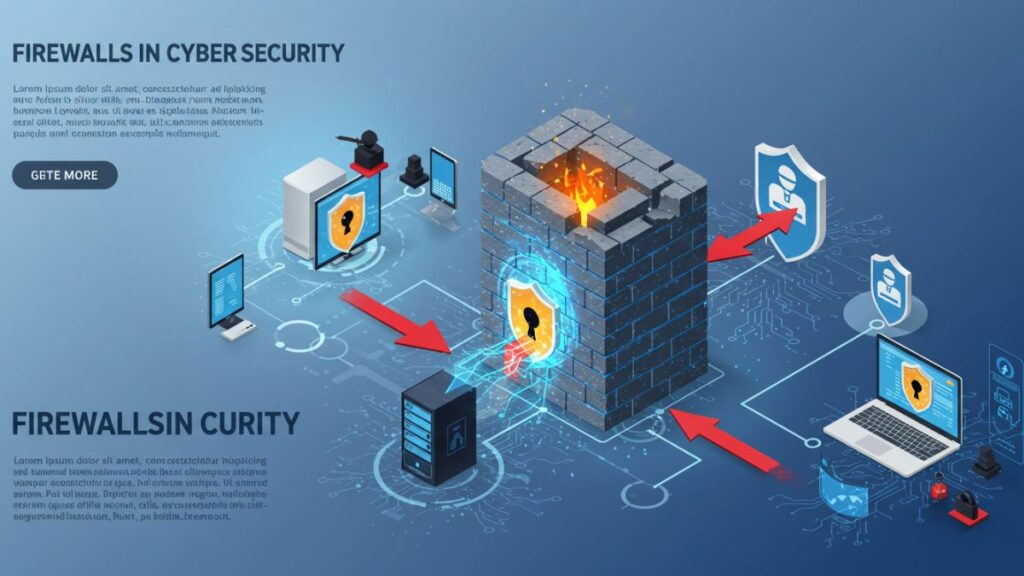Key Takeaways
- Firewalls are pivotal in protecting network environments, with distinct hardware and software options available.
- Hardware firewalls offer extensive network-wide protection; software firewalls provide targeted security for individual devices.
- Choosing hardware and software entails carefully analyzing security requirements, cost, and scalability needs.
Overview of Firewalls
In cybersecurity, firewalls are indispensable components that shield networks from unauthorized access and potential threats. As the first line of defense, they meticulously scrutinize and filter incoming and outgoing network traffic. The ongoing debate about hardware vs software firewalls often centers on their unique characteristics and the specific scenarios where one might be preferable. Understanding these differences is crucial for anyone responsible for safeguarding digital environments.
The role of firewalls extends beyond blocking unwanted traffic—they are vital for creating secure networks that can support safe communication and data transfer. In an era where data breaches are increasingly common, firewalls’ ability to offer layers of protection makes them a critical element in any cybersecurity strategy. This article delves into how these two types of firewalls function and their advantages and limitations, providing comprehensive insights for users aiming to bolster their cybersecurity posture.
Types of Firewalls: Hardware vs. Software
Firewalls are categorized into two main types: hardware and software, each with its features. Hardware firewalls are standalone equipment placed strategically within networks, often at the entry point where local networks meet the external internet. These devices act as a centralized security checkpoint, ensuring that only legitimate data enters and exits a network.
- Hardware Firewalls: Hardware firewalls effectively control large traffic volumes across extensive networks. Their architecture allows them to handle large data throughput, making them ideal for businesses with considerable network demands. These systems are engineered to provide comprehensive protection by implementing a security protocol across the entire network, which safeguards against unauthorized access, attacks, and data breaches.
- Software Firewalls: In contrast, software firewalls are implemented on individual devices. Their purpose is to provide a tailored security solution that can be modified to address the specific needs of both the device and the user. This flexibility allows users to implement unique security settings that better protect them from particular threats, depending on their usage patterns. Software firewalls are particularly favored by users who require a more customizable security solution that integrates seamlessly with other applications.
Benefits of Using Hardware Firewalls
One of the standout benefits of hardware firewalls is their ability to provide a high level of security across entire networks without affecting the performance of individual workstations. Hardware firewalls can handle high traffic volumes, making them suitable for organizations with complex and large-scale networks. This scalability is crucial in environments where uptime and speed are critical.
Additionally, a TechRadar report highlights the reliability of hardware firewalls due to their isolation from the systems they protect. Thus, they reduce the risk of being tampered with by malware or unauthorized access. They act as an outer shield, protecting vulnerable internal devices and ensuring that malicious activities are stopped at the gate before they cause harm within the network.
Limitations of Hardware Firewalls
Despite the benefits of implementing hardware firewalls, some inherent limitations must be considered. The initial investment required for these devices can be significant, which might pose a barrier for smaller organizations with limited budgets. Moreover, they often demand technical expertise for installation and ongoing management, necessitating dedicated IT support or outsourcing.
Furthermore, once configured, hardware firewalls can be less adaptable to rapid changes in network infrastructure or varying security needs. Their static setup might not be optimal for environments that require frequent reconfiguration or quick scalability adjustments to accommodate changes in user demand or increased digital expansion.
Software Firewalls: A Flexible Solution
Software firewalls offer an advantageous solution for individual and minor network security needs. Their ease of installation and adaptability make them suitable for less complex environments where specific devices require customized protective measures. The reduced expense linked to software firewalls renders them a sensible option for home users and small enterprises aiming for sufficient security without significant financial outlay.
Software firewalls’ flexibility in configuring allows users to fine-tune security protocols to match their unique interactions with web applications and software. With regular updates that align with developing security threats, software firewalls can provide robust protection with minimal investment in physical infrastructure.
How to Choose Between Hardware and Software Firewalls
Choosing the appropriate type of firewall necessitates a thorough assessment of individual and organizational needs. Considering factors such as the complexity of the network, budget constraints, and desired security level. Hardware firewalls typically appeal to organizations requiring a strong. Centralized security system capable of managing high volumes of network traffic with consistent policy enforcement across multiple devices.
In contrast, environments that require more flexibility and personalized security settings might prefer software firewalls. As noted by CNET, software firewalls offer dynamic configurability. Making them ideal for users who prioritize cost-effectiveness and ease of integration into existing digital systems. Such decisions should align with current security challenges and anticipated growth or changes within the network infrastructure.
Real-Life Applications and Case Studies
Hardware firewalls have proven indispensable in various industrial settings, where robust, overarching security measures are crucial. For instance, large financial institutions use hardware firewalls to secure sensitive data transactions. Maintaining the integrity and confidentiality required by financial regulations and customer expectations. This widespread implementation confirms their pivotal role in maintaining secure and reliable operations.
Conversely, smaller businesses or startups often use software firewalls to protect devices without a hefty upfront investment. The flexibility offered by software firewalls has allowed these entities to maintain a high-security standard while remaining agile enough to adapt to the fast-paced changes characteristic of entrepreneurial endeavors.
Conclusion: The Future of Firewall Technology
As technology continues to evolve, so too do the methods and sophistication of cyber threats. The advancement of firewall technology is increasingly dependent on incorporating sophisticated artificial intelligence and machine learning features. Which empower firewalls to anticipate and prevent threats proactively before they emerge. The ability to automatically adapt to new attacks will be a game-changer in cybersecurity.
This evolution is essential as digital environments become more complex and interconnected. Continuous adaptation and vigilance ensure networks remain fortified against emerging threats. This underscores the critical need to stay abreast of technological advancements to maintain optimal security.







